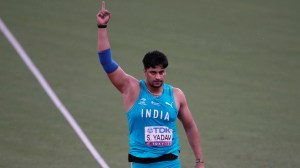Modi govt blocks UN funds to SEWA’s quake rehabilitation project for village women
SEWA, the 5-lakh-member Self-Employed Women’s Association, synonymous with women’s empowerment in Gujarat, is now facing the heat ...

SEWA, the 5-lakh-member Self-Employed Women’s Association, synonymous with women’s empowerment in Gujarat, is now facing the heat of the Narendra Modi Government.
For the first time, funds to SEWA have been blocked by the state which has raised a slew of ‘‘audit objections.’’ Objections that range from diverting project money to a relative of top SEWA functionaries to charging Rs 1 per page for photocopying.
SEWA officials rebut the allegations but the immediate casualty of this stand-off is Jeevika, a Rs 113-crore project, meant to provide livelihood to at least 12,000 women worst-affected by the 2001 earthquake in the districts of Kutch, Surendranagar and Patan.
The International Fund for Agriculture Development (IFAD), a UN agency, is funding the seven-year project—which began three years ago—routing money through the Centre to the state government’s rural development department. So far the state has disbursed Rs 8 crore.
Says Rural Development Minister Bharat Barot: ‘‘There are a number of issues which need to be sorted out. After the special audit, is over we will release the funds.’’
This special audit panel, set up in April, questioned SEWA’s accounts and issued several notices. Even a government camera team was sent to get on tape several men in the villages who claimed they were “unhappy and disappointed’’ with SEWA’s work.
Meanwhile, many SEWA village centres are being wound up—in at least 400 villages, women on SEWA’s payroll are not getting their wages.
‘‘Financial irregularities is just one aspect, there are other issues as well,’’ says Jyotika Bannerjee, head of Jeevika Cell of Gujarat State Rural Development Department, which coordinates with SEWA. ‘‘SEWA wants funds but is unwilling to listen to the government where discussions are necessary at the planning stage. The manner in which they were spending the money forced the government to set up a special audit.’’
Consider the key objections raised by the special audit and SEWA’s counter:
• Gujarat Govt: Ahmedabad-based Disaster Mitigation Institute (DMI) headed by Mihir Bhatt, son of SEWA’s mentor Ilaben Bhatt, and husband of SEWA’s general secretary Reema Nanavati, has been paid close to Rs 45 lakh for its services to SEWA.
SEWA: Says national coordinator Renana Jhabvala: ‘‘We did not pick up DMI on our own, it was IFAD which approved it and recommended that its services can be used.’’
• SEWA channels funds through sister concerns like SEWA’s bank, insurance, cooperative centre.
This was done to streamline operations. To avoid opening new accounts in other banks, SEWA provided its own infrastucture in SEWA Bank for beneficiaries. Even then, after a query was raised last year, SEWA closed the accounts in its bank and opened new accounts in other banks.
• SEWA sent members on foreign trips without govt approval.
No member has gone abroad under the ‘Jeevika’ project. When the Export Promotion Council for Handicrafts of the Government of India asked SEWA to exhibit its products at an exhibition in Berlin, SEWA sent the products and claimed freight charges.
• SEWA constructed buildings under the project and began charging rent for its use.
No buildings constructed. 300 sq feet of SEWA’s own office space has been dedicated to Jeevika with seven employees working there full time. For this, SEWA charged rent at the rate of Rs 20 per sq feet which is according to existing market rates.
• Out of the Jeevika money, SEWA has allocated Rs 4.21 crore for its own Trade Facilitation Centre.
Trade Facilitation Centre is meant for women involved in embroidery work, sewing and knitting. 30 per cent of this is working capital which SEWA will return to government at the end of the project.
• SEWA used existing infrastructure like fax machines, telephones etc and billing them as expenses. Paid Re 1 per page photocopy which is high and has charged Rs 100 for a camera used to record a training workshop.
SEWA has provided rate charts for various kinds of photocopying, only once Rs 1 per page was paid. Govt denied permission to buy a camera so SEWA used its own camera and charged rent for it.
• SEWA paid Rs 7 per km for a hired car which is high. It hired a bigger vehicle when a small car would have sufficed.
Rs 7 per km includes charges for the vehicle being retained overnight. Members carry material to be distributed for which a jeep or a vehicle is more suited. Women members said they felt more safe being in a Jeep or Tata Sumo while traversing the villages.
Sources said SEWA’s friction with the BJP government isn’t new. During the 2002 riots, SEWA worked with nearly 40,000 women in relief camps in Ahmedabad, Kheda and Anand.
When former Prime Minister A B Vajpayee visited the relief camps, he announced that the Centre would give special funds to SEWA and expressed confidence that its founder Ilaben Bhatt would be able to provide trauma counselling to the victims.
Also, SEWA has nearly one lakh members in the Radhanpur and Santalpur areas in Patan and Banaskantha districts and 50 per cent of these are Muslims and Dalits.
According to SEWA women working in the villages in these areas, tension is brewing there as upper-caste people resent the work being done for minorities and SC/STs.
Photos



- 01
- 02
- 03
- 04
- 05




























